

Profession. A profession is a vocation founded upon specialized educational training, the purpose of which is to supply objective counsel and service to others, for a direct and definite compensation, wholly apart from expectation of other business gain.[1] The term is in essence a rather vaguer version of the term "liberal profession", an anglicisation of the French term "profession libérale".
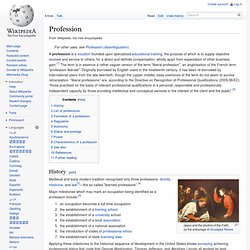
Originally borrowed by English users in the nineteenth century, it has been re-borrowed by international users from the late twentieth, though the (upper-middle) class overtones of the term do not seem to survive retranslation: “liberal professions” are, according to the Directive on Recognition of Professional Qualifications (2005/36/EC) “those practised on the basis of relevant professional qualifications in a personal, responsible and professionally independent capacity by those providing intellectual and conceptual services in the interest of the client and the public”.[2] Scientist. Montage of some highly influential scientists from a variety of scientific fields.
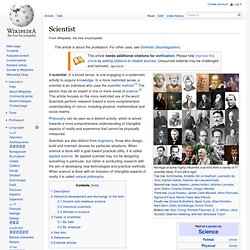
List of professions. Language interpretation. Language interpretation, or interpreting, is the facilitating of oral or sign-language communication, either simultaneously or consecutively, between users of different languages.
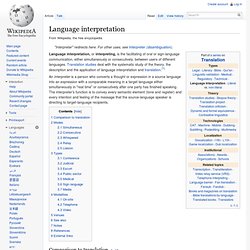
Translation studies deal with the systematic study of the theory, the description and the application of language interpretation and translation.[1] An interpreter is a person who converts a thought or expression in a source language into an expression with a comparable meaning in a target language either simultaneously in "real time" or consecutively after one party has finished speaking. The interpreter's function is to convey every semantic element (tone and register) and every intention and feeling of the message that the source-language speaker is directing to target-language recipients. Comparison to translation[edit] Despite being used in a non-technical sense as interchangeable, interpreting and translation are not synonymous. Veterinary physician. A vet conducts a routine spaying operation on a domestic cat.
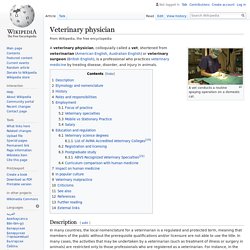
A veterinary physician, colloquially called a vet, shortened from veterinarian (American English, Australian English) or veterinary surgeon (British English), is a professional who practices veterinary medicine by treating disease, disorder, and injury in animals. Description[edit] In many countries, the local nomenclature for a veterinarian is a regulated and protected term, meaning that members of the public without the prerequisite qualifications and/or licensure are not able to use the title. In many cases, the activities that may be undertaken by a veterinarian (such as treatment of illness or surgery in animals) are restricted only to those professionals who are registered as a veterinarian.
Etymology and nomenclature[edit] The word veterinary comes from the Latin veterinae meaning "working animals". Software engineering professionalism. Software engineering professionalism is a movement to make software engineering a profession, with aspects such as degree and certification programs, professional associations, professional ethics, and government licensing.

The field is a licensed discipline in Texas in the United States, BS Australia[clarification needed][1](since 2001), and many provinces in Canada. History[edit] In 1993 the IEEE and ACM began a joint effort called JCESEP, which evolved into SWECC in 1998 to explore making software engineering into a profession. The ACM pulled out of SWECC in May 1999, objecting to its support for the Texas professionalization efforts, of having state licenses for software engineers. In Canada the Canadian Information Processing Society established the Information Systems Professional certification process. Ethics[edit] Software engineering ethics is a large field. These codes of ethics usually have much in common. Surgeon. Translation. Translators always risk inappropriate spill-over of source-language idiom and usage into the target-language translation.

On the other hand, spill-overs have imported useful source-language calques and loanwords that have enriched the target languages. Indeed, translators have helped substantially to shape the languages into which they have translated.[3] Due to the demands of business documentation consequent to the Industrial Revolution that began in the mid-18th century, some translation specialties have become formalized, with dedicated schools and professional associations.[4] Because of the laboriousness of translation, since the 1940s engineers have sought to automate translation (machine translation) or to mechanically aid the human translator (computer-assisted translation).[5] The rise of the Internet has fostered a world-wide market for translation services and has facilitated language localization.[6]
Audiology. Audiology (from Latin audīre, "to hear"; and from Greek -λογία, -logia) is the branch of science that studies hearing, balance, and related disorders.
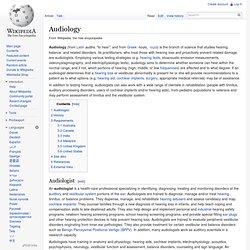
Its practitioners, who treat those with hearing loss and proactively prevent related damage are audiologists. Employing various testing strategies (e.g. hearing tests, otoacoustic emission measurements, videonystagmography, and electrophysiologic tests), audiology aims to determine whether someone can hear within the normal range, and if not, which portions of hearing (high, middle, or low frequencies) are affected and to what degree. If an audiologist determines that a hearing loss or vestibular abnormality is present he or she will provide recommendations to a patient as to what options (e.g. hearing aid, cochlear implants, surgery, appropriate medical referrals) may be of assistance.
Statistician. A statistician is someone who works with theoretical or applied statistics.
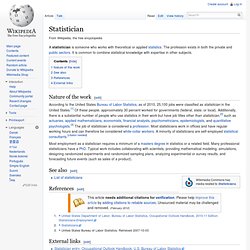
The profession exists in both the private and public sectors. It is common to combine statistical knowledge with expertise in other subjects. Nature of the work[edit] Teacher. Jewish children with their teacher in Samarkand, the beginning of the 20th century A teacher (also called a schoolteacher) is a person who provides education for pupils (children) and students (adults).
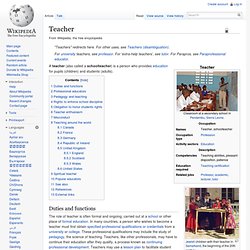
Archivist. An archivist surveying an unprocessed collection of materials.
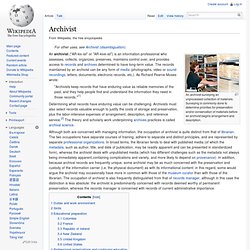
Surveying is commonly done to determine priorities for preservation and/or conservation of materials before an archivist begins arrangement and description. Architect. An architect is a person who plans, designs, and oversees the construction of buildings. To practice architecture means to provide services in connection with the design and construction of buildings and the space within the site surrounding the buildings, that have as their principal purpose human occupancy or use.[1] Etymologically, architect derives from the Latin architectus, which derives from the Greek arkhitekton (arkhi-, chief + tekton, builder), i.e., chief builder.[2] Professionally, an architect's decisions affect public safety, and thus an architect must undergo specialized training consisting of advanced education and a practicum (or internship) for practical experience to earn a license to practice architecture.
Practical, technical, and academic requirements for becoming an architect vary by jurisdiction (see below). Origins[edit] Architecture[edit] To practice architecture implies the ability to practice independently of supervision. Practice[edit] Design role[edit] Advocate. An advocate is a type of professional person in several different legal systems. These include Scotland, Belgium, South Africa, India, Scandinavian jurisdictions, Israel, Brazil and the British Crown dependencies of Jersey, Guernsey and the Isle of Man.
The broad equivalent in many English law-based jurisdictions is "barrister". India[edit] Actuary. An actuary is a business professional who deals with the financial impact of risk and uncertainty. Actuaries provide assessments of financial security systems, with a focus on their complexity, their mathematics, and their mechanisms (Trowbridge 1989, p. 7). The name of the corresponding profession is actuarial science. The profession has consistently ranked as one of the most desirable in various studies over the years. In 2006, a study by U.S. News & World Report included actuaries among the 25 Best Professions that it expects will be in great demand in the future (Nemko 2006).
Accountant. An accountant is a practitioner of accounting or accountancy, which is the measurement, disclosure or provision of assurance about financial information that helps managers, investors, tax authorities and others make decisions about allocating resources. In many jurisdictions, professional accounting bodies maintain standards of practice and evaluations for professionals. Accountants who have demonstrated competency through their professional associations' certification exams are certified to use titles such as Chartered Accountant or Certified Public Accountant. Such professionals are granted certain responsibilities by statute, such as the ability to certify an organization's financial statements, and may be held liable for professional misconduct.
Non-qualified accountants may be employed by a qualified accountant, or may work independently without statutory privileges and obligations. British Commonwealth[edit] Aviator. The Wright Brothers - pilots credited with inventing and building the world's first airplane. Occupational therapist. Speech-Language Pathology. Officer (armed forces) Non-commissioned officers (NCOs) in positions of authority can be said to have control or charge rather than command per se; the use of the word "command" to describe any use of authority is often unofficial. Having officers is one requirement for combatant status under the laws of war, though these officers need not have obtained an official commission or warrant.
Lawyer. Information and communications technology. Financial analyst. Engineer. Economist. An economist is a professional in the social science discipline of economics. Physician. Dentist. Pharmacist. Nursing. Optometry. Diplomat. Surname Index (C's)